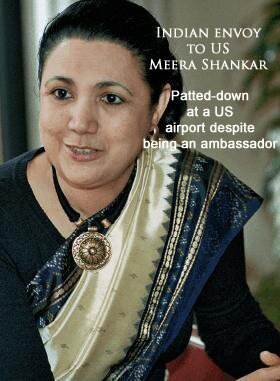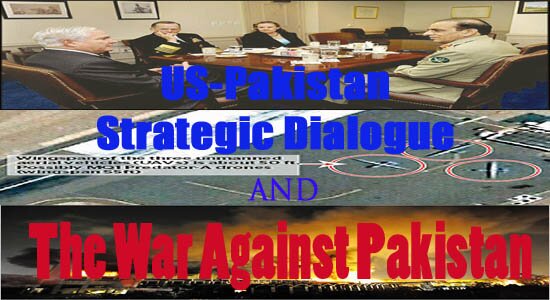 Print This Post
Print This Post  Email This Post
Email This Post
India’s Envoy Miss Shankar Frisked At US Airport On Terror Suspicion
- Pulled from an airport line and patted down; second Indian official to face stringent US checks after ex-India president
- Indian minister Krishna covered up on the story for five days to avoid issuing a statement critical of US
The humiliation faced by India’s ambassador at a US airport is linked to recent events when Indian citizens linked to the Indian government were found engaged in suspicious activities related to terrorism and nuclear espionage, including on US soil.
SPECIAL REPORT | Thursday | 9 December 2010
WWW.PAKNATIONALISTS.COM
WASHINGTON, DC—Reports are emerging of an ugly incident involving India’s ambassador to Washington Miss Meera Shankar last week.
Ambassador Shankar was at the Jackson-Evers International Airport in Mississippi, returning to Washington after a local university event.
According to one report, she was about to board a flight when airport security pulled her away from a line to a room where a female officer patted her down. US airport officials brushed aside Indian demands she be exempted from this treatment because she is an ambassador.
“This is unacceptable to India and we are going to take it up with the US government and I hope things could be resolved so that such unpleasant incidents do not recur,” External Affairs Minister SM Krishna told reporters in Delhi.
Interestingly, the incident took place on 4 December but Minister Krishna and the Indian Ministry of External Affairs kept it under wraps for fear of damaging US-India relations. Krishna was forced to issue a comment today after the story leaked.
She has become the second senior Indian official to be frisked at an airport security line and checked on suspicions related to terrorism or nuclear espionage. In July 2009, former Indian president APJA Kalam was forced to take off his shoes and submit to US checks before boarding a flight to the United States.
‘Suspicious Indians’
US homeland security officials have been concerned at a pattern over the past decade where private or government-employed Indian citizens have been stopped at US airports for indulging in terrorism-related activities, nuclear espionage or export of sensitive technology.
In August, Vijay Kumar, an Indian who introduced himself as a filmmaker, was stopped at a Houston airport and jailed for five days because agents found him hiding a gun and carrying Muslim jihadi material. When asked why an Indian Hindu would be carrying Muslim literature and a gun, the Indian failed to give a reasonable answer. He said he made films on what he called ‘Islamic terrorism’ and was invited by an extremist Hindu organization to deliver a lecture.
Hindu activists have recently been indicted in India for involvement in terror incidents designed to create backlash against Muslim populations or create misunderstandings between US and Pakistan.
‘Nuclear Espionage’
US officials have also been concerned about Indian diplomats involved in nuclear espionage in the United States. While no major incidents have surfaced as in the case of Washington’s other ally, Israel, Indian diplomats have been found in the past facilitating front companies in the export of sensitive technology to India.
According to US security experts, Indian diplomats are under observation despite the cozy ties between Washington and New Delhi.
Two Indian companies, Sabero Organics Chemical and the Sandhya Organics Chemical, were sanctioned by the Bush administration in 2005 for involvement in nuclear technology export to Iran.
Two senior Indian nuclear scientists, YSR Prasad and C. Surender, the former heads of the state-run Nuclear Corporation of India, were also blacklisted by the US government for similar reasons.
These issues are a matter of concern for US officials but are intentionally kept low in US government’s overt and covert public diplomacy and media outreach efforts, which are more focused on countries such as Russia, China and Pakistan.
© 2007-2010. All rights reserved. PakNationalists.com
Verbatim copying and distribution of this entire article is permitted in any medium
without royalty provided this notice is preserved.








Leave a Reply